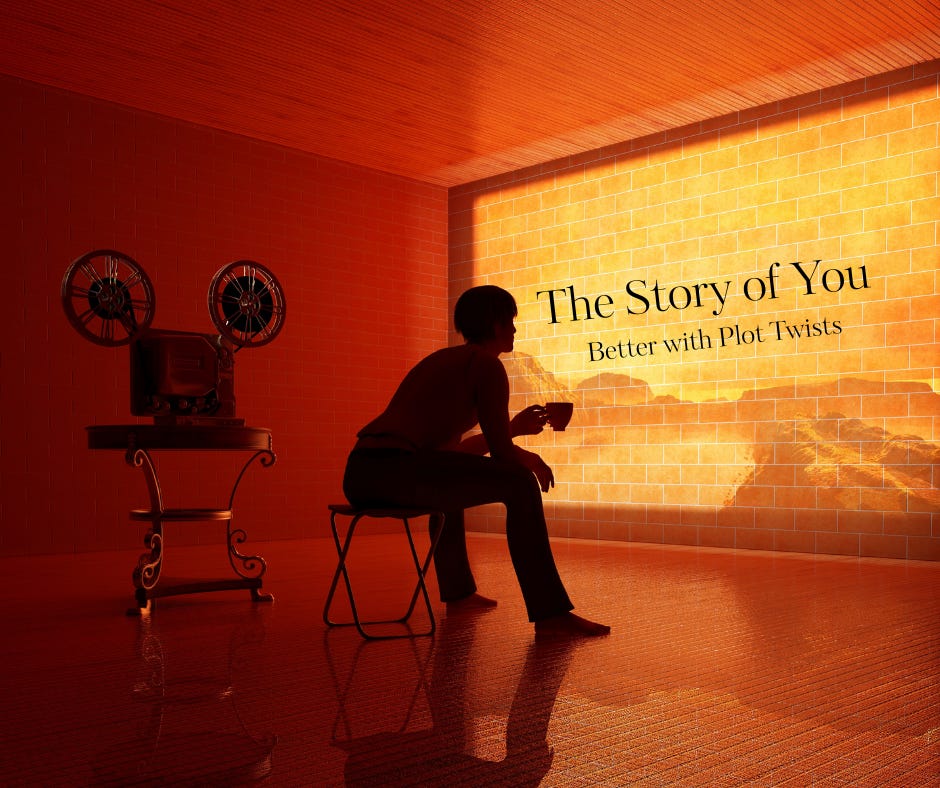The Story of You
better with plot twists
What takes a story from good to great, on a page or on a screen?
Plot twists.
When you get to a part where you can honestly say, “I didn’t see that coming,” it’s not a bummer; it’s awesome. Why? Because for just a second, you were outsmarted, and you liked it. You were caught off guard in the best way possible, and reminded that the story is bigger, smarter, and riskier than the version you had built in your head. You put that book down or leave the theater, giving the writer props for handing you just what you wanted: excitement and a chance to hope.
But real-life plot twists aren’t as awesome. Throw me a curve ball, shake my world, and suddenly I’m wondering who approved this script, and I’m questioning the Director, who’s apparently lost all control on the set of my life.
Instead of making a good movie, I mean life, great, the plot twist invites me to worry, to take my eyes and point them down into the pit of despair, where I’ve decided to let the twist send me, and I fall.
Granted, living out a plot twist in real life is different than watching a 2-hour movie. In a movie, I trust the writer. I know the story will all make sense soon enough. Obviously, the disaster will do something fantastic to the protagonist. But in real life, all I can see is inconvenience, distraction, and ruin. I don’t expect a happy ending. I don’t see a glorious destination. I just assume I’ve been abandoned by the side of the road and left to fend for myself.
Twists mess with the plot in your head. They warp it, mangle it, bend it out of shape until it doesn’t look anything like the plot you had expected. But that doesn’t mean the Author has given the pen to someone else to write for Him, some terrible author who only wants to torment you.
The twist is still inked in His handwriting. It’s just written in a dialect you don’t yet understand. That’s the hidden brilliance: the very scene you resist is the one He’ll use to draw you further in. To shift your gaze. To stir up a loyalty and a longing you didn’t know you had.
“For my thoughts are not your thoughts, neither are your ways my ways,” declares the Lord. “As the heavens are higher than the earth, so are my ways higher than your ways and my thoughts than your thoughts.” -Isaiah 55:8–9
Just look at the plot twists in the Bible:
The Israelites railed against their plot twist at the Red Sea. But when the sea split, Israel didn’t just get safety, they got awe.
Naomi thought her plot twist was so bad she renamed herself “bitter.” But when she held Obed, she didn’t just get a new family; she got folded into the lineage of Christ.
The disciples hated the plot twist of the cross, but soon found the Author stepping back into the story He had just been killed in, and rewriting the ending no one thought could change.

Every twist, as unbearable as it feels, is wired with that kind of potential. And it’s meant to take the small script you’ve been dreaming of and set fire to it, only to show you that there’s been a better story running underneath all along.
In the movie theater, we lean forward in awe as the story startles and surprises us, because we trust the writer and savor the thrill of being given something to hope for.
In real life, we groan, panic, and protest. But your hope doesn’t have to wait until the final credits roll. Even here, in the middle, the Author hasn’t lost the pen. And one day, you may find yourself looking back on this twist with the same astonished delight you felt in that darkened theater, whispering, maybe through tears, “I didn’t see that coming… but I’m so glad it did.”




This came at the perfect time for me, professionally and personally! Thank you for posting today <3